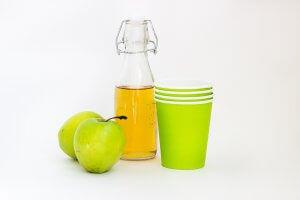What are the best substitutes for Apple Juice?
Are you looking for a substitute for apple juice? Try using Orange Juice, Lemon or Lime Juice, Pear Juice, Pineapple Juice, White wine, Red/White wine vinegar, or Apple cider.
Whether you want to drink it, use it as a glaze, add it into a sauce, or bake with it, apple juice is a versatile ingredient. It is readily available and normally quite easy to find, but what happens when you run out of it? Well hopefully you will find something in our list of substitutes that can help.
What is Apple Juice?
You make apple juice by pressing the apples and their liquid content is collected. It is a popular drink consumed worldwide and is often considered a refreshing and sweet option. The process involves many steps, from growing, right through to when it lands on the supermarket shelf. Here is a quick rundown for you.
- Harvesting: Harvest ripe apples from apple orchards.
- Cleaning and Sorting: Thoroughly clean the apples to remove dirt and impurities. Also sort the apples to ensure that you use only the best quality apples.
- Pressing: The cleaned apples are then crushed and pressed to extract their juice. This can be done using various methods, such as hydraulic presses or centrifugal juicers.
- Filtering: To get a clear liquid you must filter the extracted extracted juice. This will remove any remaining pulp or solid particles, resulting in a clear liquid.
- Pasteurization: To extend its shelf life and ensure food safety, the apple juice is pasteurized by heating it to a specific temperature for a certain duration. This process kills any harmful bacteria or microorganisms present in the juice.
- Packaging: After pasteurization, the apple juice is packaged in bottles, cartons, or cans for distribution and sale.
Apple juice comes in a few different forms such as freshly pressed, concentrated, canned or frozen.
You can consume apple juice on its own, or use it as a base for various beverages, or incorporate it into cooking and baking recipes. It is a popular choice among children and adults alike. It has a naturally sweet taste and pleasant flavor, making it a refreshing and enjoyable drink, especially when served chilled.
Okay, before we look at your apple juice substitute options, let’s deal with that empty cupboard situation!
Where can I buy Apple Juice?
If you want to be more prepared and ensure you don’t run out of apple juice then you should stock up now.
Nowadays most delicatessens and general supermarkets stock a wide variety of apple juice. Or if you prefer you can also purchase apple juice on-line. Here is a link for a bottle of concentrated apple juice.
So why not jump on and place your order today.
STOCK UP NOW!
100% Apple Juice – concentrated.
This juice delivers a refreshing and satisfying flavor experience with every sip. Not too sweet, but so refreshing.
What can I substitute for Apple Juice?
Here are some of the best ingredients to substitute the flavor and role that apple juice provides in your recipes.
- Orange Juice
- Lemon or Lime Juice
- Pear Juice
- Pineapple Juice
- White wine
- Red or white wine vinegar
- Apple cider
Apple Juice substitutes
Orange Juice
Using orange juice as a substitute for apple juice can add a citrusy twist to your recipes. However, since orange juice has a distinct flavor compared to apple juice, you should consider the compatibility with the other ingredients in the dish. Here are some ways you can use orange juice as a substitute for apple juice:
- Beverages: Use orange juice as a substitute for apple juice in various beverages. You can enjoy it as a refreshing drink on its own or mixed with other fruit juices for flavorful blends. You can drink it freshly squeezed, with bits, or without, or you could also drink the concentrated varities.
- Smoothies: Replace apple juice with orange juice in your smoothie recipes. The tangy and sweet taste of oranges can add a vibrant flavor to your smoothies.
- Baking: In certain baking recipes, you can use orange juice instead of apple juice. This works especially in recipes where the citrusy flavor complements the other ingredients. For example, it can work well in muffins, cakes, and certain bread recipes.
- Marinades and Glazes: Orange juice can be a delicious substitute in marinades and glazes for meats. Its acidity and sweetness can help tenderize the meat and add a citrusy zing to the flavor.
- Sauces and Dressings: Use orange juice in sauces and dressings, especially when the tangy taste complements the dish. It can add a bright flavor to salads and savory dishes.
- Cocktails: Orange juice is a popular ingredient in cocktails, and you can use it to create various mixed drinks and mocktails.
Keep in mind that while using orange juice as a substitute for apple juice can be creative and delicious, it will alter the overall flavor of the recipe. Ensure that the orange flavor complements the other ingredients. And always adjust other sweeteners or acidic elements as needed to balance the taste. Also, consider the texture difference as orange juice may have pulp, while apple juice is usually clear.
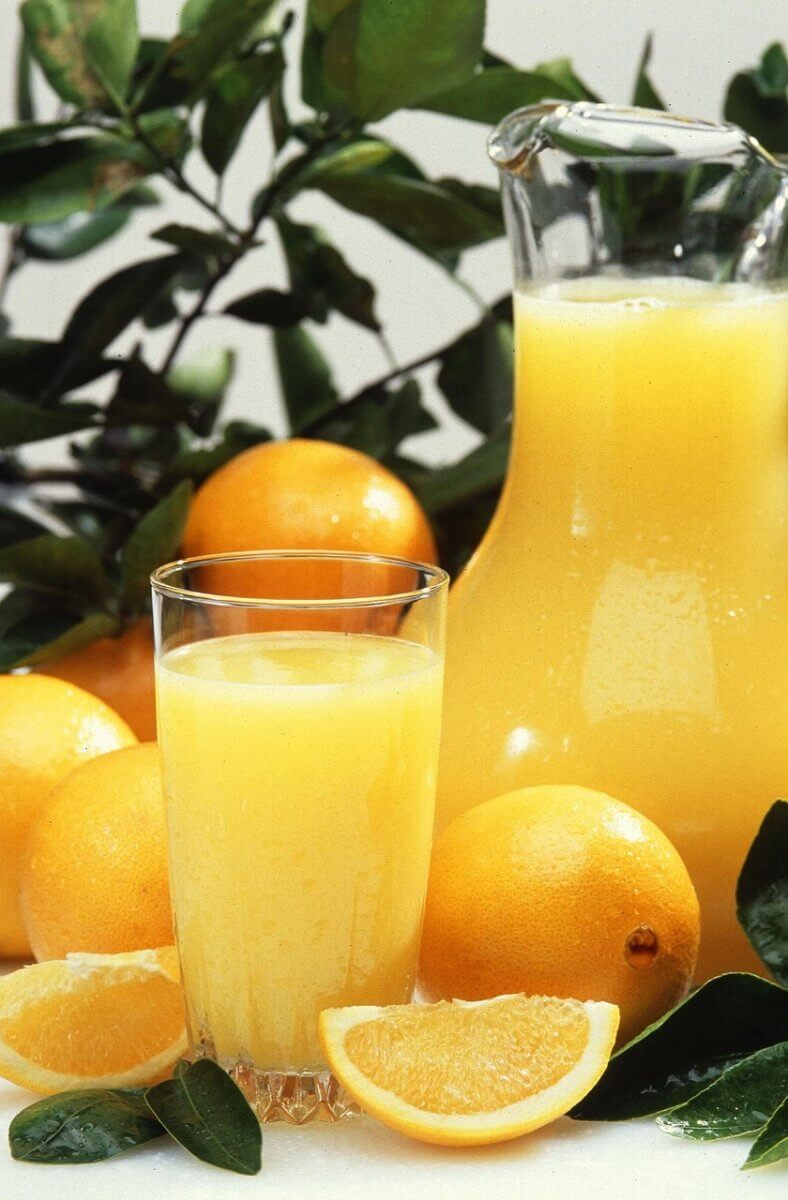
Lemon or Lime Juice
Using lemon or lime juice as a substitute for apple juice can add a tangy and citrusy twist to your recipes. However, it’s important to be aware that both have a very different flavor profile from apple juice.
- Beverages: Use lime juice in beverages like limeade or lemonade. You can mix it with water and sweeten it to taste with sugar or honey. You can also use lemon juice can also to make lemonade, which is a classic and refreshing citrus beverage. You can mix it with water and sweeten it with sugar or honey to taste.
- Citrus-Flavored Dishes: Try adding lime juice in recipes where a citrusy flavor complements the other ingredients. For example, you can use it in salad dressings, ceviche, or marinades for seafood. Lemon juice also works well in recipes that call for a bright and tangy flavor. You can also use it in salad dressings, marinades for meats or seafood, and as a finishing touch to various dishes.
- Cooking and Grilling: Use lime juice in cooking or grilling recipes that call for apple juice as a cooking liquid or a base for glazes. It will add a bright and tangy flavor to the dish. And in certain cooking recipes, you can use lemon juice to add acidity and a citrus kick. For example, it can be used in cooking liquids, glazes, or even to brighten up the flavor of sauces.
- Cocktails: Lime juice is a classic ingredient in cocktails such as margaritas, mojitos, and daiquiris. You can use it to create a variety of refreshing mixed drinks. You can also find lemon juice in many cocktails, such as the classic lemon drop martini or whiskey sours. You can also use it in mocktails for a non-alcoholic option.
- Baking: In certain baking recipes, you can use lime juice to add a citrus flavor. Lime juice can work well in certain cake, muffin, or cookie recipes. You can also use lemon juice in certain cooking and baking recipes. It can add a hint of acidity and a citrus kick. For example, you can use it in cooking liquids, glazes, or even to brighten up the flavor of sauces.
- Smoothies and Fruit Blends: If you enjoy experimenting with flavors, you can use lime juice or lemon juice in smoothies and fruit blends to add a zesty kick.
When using lemon or lime juice as a substitute for apple juice, remember to adjust the sweetness and other ingredients to balance the flavors. Remember they are much more acidic than apple juice and also have a different level of sweetness.
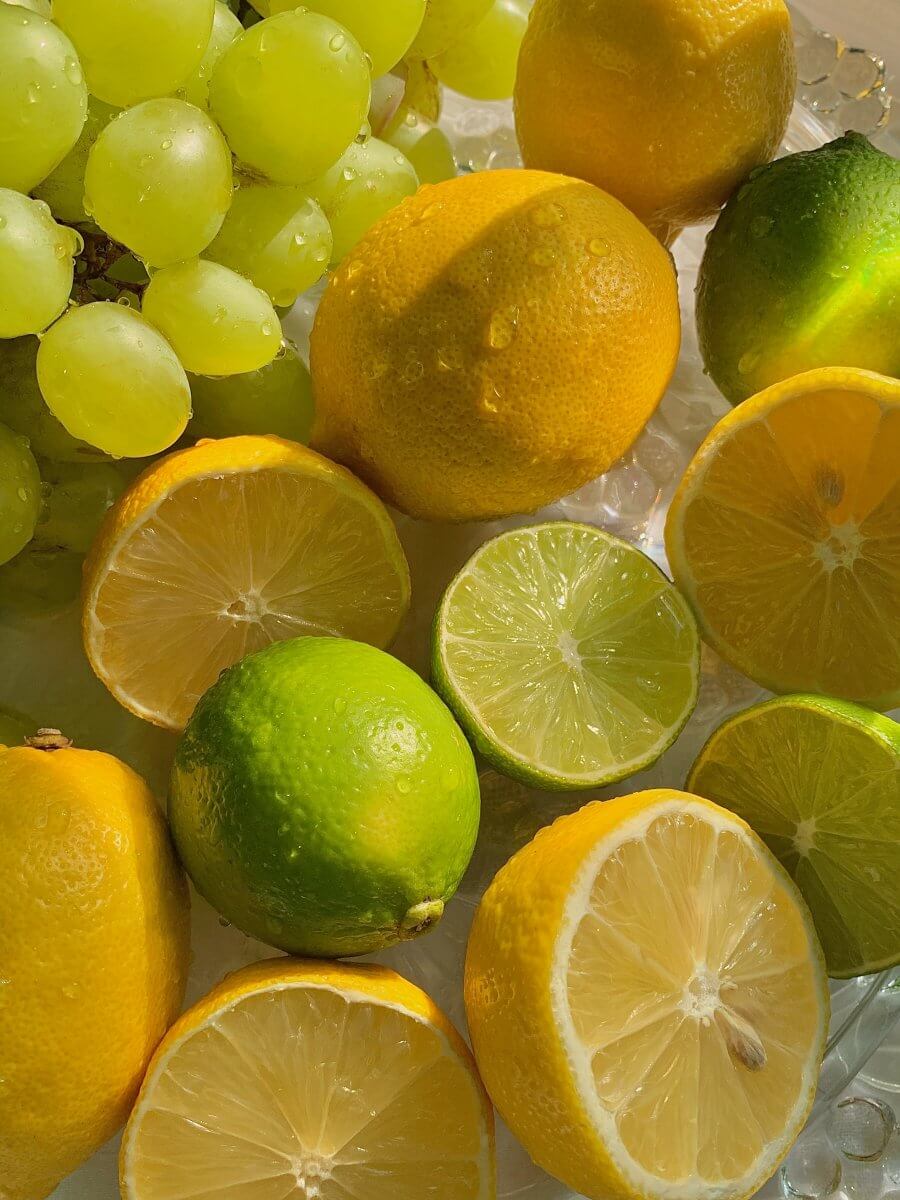
Pear Juice
Using pear juice as a substitute for apple juice can work well in many recipes and beverages. Pear juice has a similar level of sweetness and a mild, fruity flavor that complements various dishes. Here are some ideas on how to use pear juice as a substitute for apple juice:
- Beverages: Pear juice can be used as a refreshing drink on its own or mixed with other fruit juices to create unique blends. You can also use it in smoothies or cocktails to add a different twist to your favorite drinks.
- Baking: In recipes that call for apple juice (muffins or cakes), you can substitute an equal amount of pear juice. The sweetness and moisture content are similar enough to yield delicious results.
- Marinades: Use pear juice as a base for meat or tofu marinades. It will add a slightly sweet and fruity note to your marinade, enhancing the flavors of your dish.
- Sauces and glazes: Replace apple juice with pear juice in sauces and glazes for meats, vegetables, or desserts. This can work particularly well with pork or chicken dishes.
- Salad dressings: Mix pear juice with other ingredients like olive oil, vinegar, and seasonings to create a tasty salad dressing.
- Poaching and stewing fruits: Just like apple juice, pear juice can be used to poach or stew fruits. It adds a natural sweetness and helps infuse the fruit with flavor.
- Jellies and jams: You can substitute pear juice for apple juice in jelly or jam recipes. The natural pectin in pears will help the mixture set properly.
Remember that while pear juice can generally be a good substitute for apple juice, it might have a slightly different flavor profile. It’s always a good idea to taste and adjust your recipes accordingly. Additionally, consider the sugar content in the juice you’re using. Some pear juices may have added sugars or be sweeter than others. If necessary, you can adjust the amount of sugar in your recipe to account for the difference in sweetness.
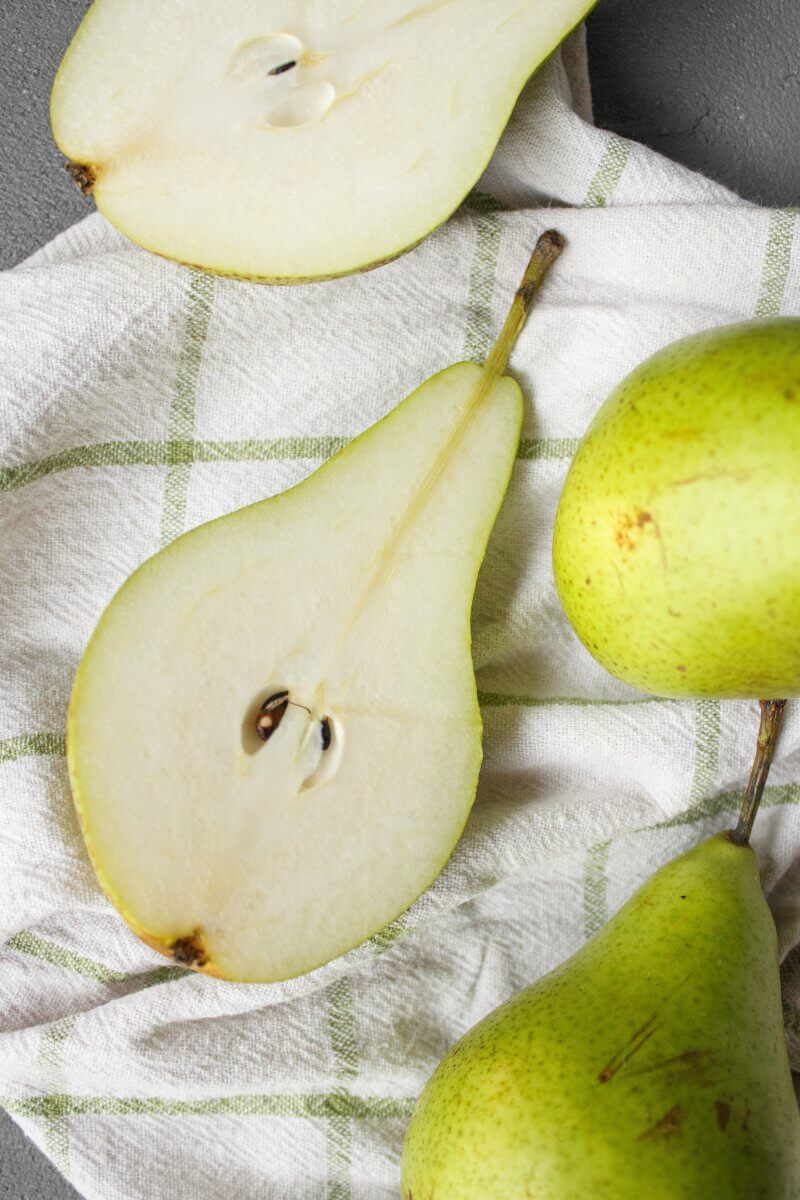
Pineapple Juice
Using pineapple juice as a substitute for apple juice can be a delightful way to add a tropical and fruity twist to your recipes. Pineapple juice has a naturally sweet and tangy flavor, so it works well in certain dishes. Here are some ways you can use pineapple juice as a substitute for apple juice:
- Beverages: Use pineapple juice as a standalone beverage, or you can mix it with other fruit juices to create refreshing tropical blends.
- Smoothies and Fruit Blends: Replace apple juice with pineapple juice in your smoothie recipes for a tropical flavor profile.
- Cooking and Grilling: Use pineapple juice as a marinade for meats, especially for dishes like Hawaiian-style grilled chicken or pork. It adds a delicious sweetness and tang to the meat.
- Baking: In certain baking recipes, pineapple juice can work well as a substitute for apple juice. This works well especially in desserts like cakes, muffins, or fruity bread.
- Cocktails: Pineapple juice is a popular ingredient in many tropical cocktails, such as piña coladas or mai tais. It can also be used in mocktails for a non-alcoholic option.
- Sauces and Glazes: Pineapple juice can be used in sauces and glazes to add a tropical touch to savory dishes.
When using pineapple juice as a substitute for apple juice, consider the sweetness and tropical flavor it brings to the dish. Adjust other sweeteners or acidic elements as needed to balance the taste. Keep in mind that pineapple juice is generally sweeter than apple juice, so it may affect the overall sweetness of the recipe. Also, consider the texture difference, as pineapple juice may have some pulp in it. It can also be more opaque compared to clear apple juice which may not look as appealing. As with any substitution, taste as you go and make adjustments to achieve the desired flavor profile.

White wine
Using white wine as a substitute for apple juice is an interesting choice that can add a different dimension of flavor to your recipes. However, it’s important to note that white wine contains alcohol and has a distinct taste compared to apple juice, so it may not be suitable for all dishes or dietary restrictions. Here are some ways you can use white wine as a substitute for apple juice:
- Cooking: Use white wine as a cooking liquid in savory dishes, especially for recipes that call for apple juice to deglaze pans, create flavorful sauces, or braise meats. It adds a unique complexity and depth of flavor to the dish.
- Marinades and Glazes: Try using white wine as a base for marinades and glazes, providing a different flavor profile compared to apple juice. It can be particularly delicious when used with poultry or seafood.
- Sauces and Dressings: You can use white wine in sauces and salad dressings, adding a subtle alcoholic undertone and tangy flavor.
- Poaching Fruit: White wine can also be used as a poaching liquid for fruits, such as pears or peaches, which would traditionally be poached in apple juice. The wine will infuse the fruits with a rich and sophisticated taste.
- Cocktails: Use white wine as a base for various wine-based cocktails, spritzers, or sangrias, providing a different flavor profile from those made with apple juice.
When using white wine as a substitute for apple juice, keep in mind that the alcohol content may not be suitable for all situations, especially if serving to children, pregnant individuals, or those who choose not to drink alcohol as a lifestyle choice. Additionally, the flavor of the dish will be impacted by the distinct taste of the wine, so consider the compatibility with other ingredients. If you want to avoid alcohol, you can try using non-alcoholic white wine or a combination of broth and a small amount of white wine vinegar as a substitute. As with any substitution, taste as you go and adjust the ingredients to achieve the desired flavor and balance.
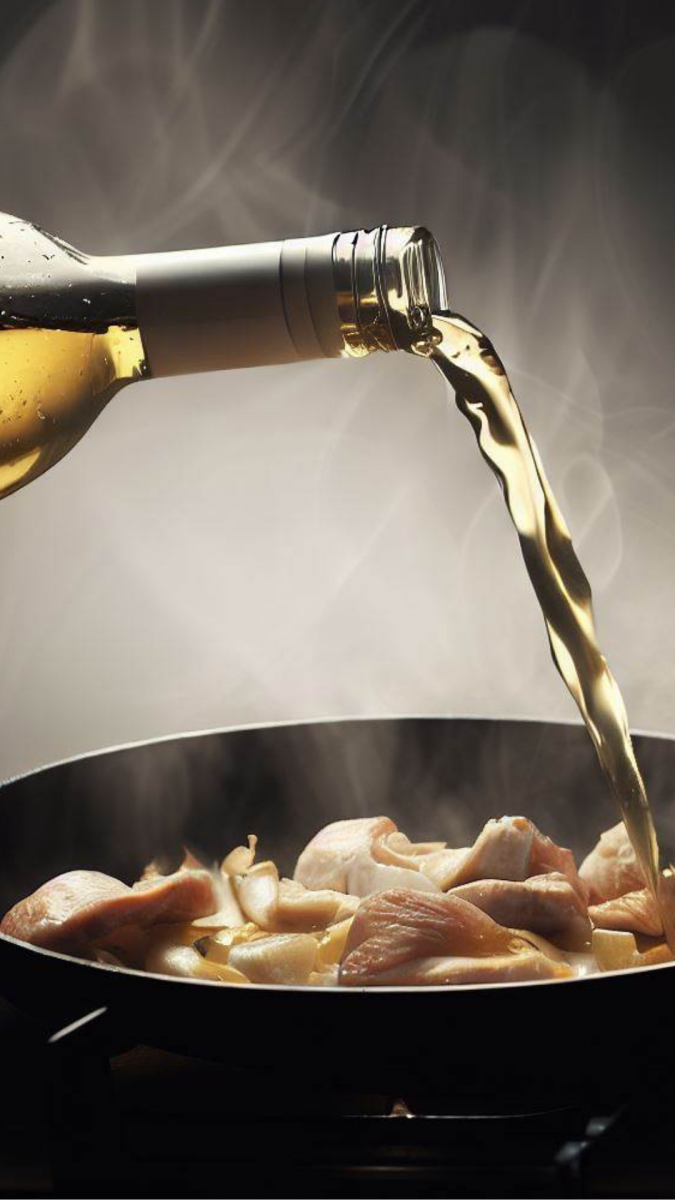
Red or white wine vinegar
White wine and red wine vinegar can be used as substitutes for apple juice in certain recipes, especially in savory dishes. Both options have distinct flavors, so it’s essential to consider their acidity and taste when making the substitution. Here’s how you can use white wine or red wine vinegar as a substitute for apple juice:
- Cooking and Deglazing: You can use white wine or red wine vinegar as a cooking liquid in recipes that call for apple juice. They work well for deglazing pans when cooking meats or vegetables, creating flavorful sauces, or braising meats. The acidity of the wine or vinegar can help tenderize the meat and add depth to the dish.
- Marinades and Glazes: Use both white wine and red wine vinegar as a base for marinades and glazes, particularly for meat and poultry dishes. They add a tangy and acidic flavor that complements the meat’s richness.
- Poaching Fruit: If you need to poach fruits, such as pears or peaches, which are typically poached in apple juice, you can use white wine or red wine vinegar instead. However, be cautious with the quantity, as the acidity may be stronger, and the flavor will differ.
- Salad Dressings: You can use red wine vinegar in salad dressings, and it can add a tangy and zesty element to your salads.
- Stir-Fries and Sauteed Vegetables: You can use a small amount of white wine or red wine vinegar to deglaze the pan when making stir-fries or sauteed vegetables, adding a burst of flavor to the dish.
When using white wine or red wine vinegar as a substitute for apple juice, remember that they are more acidic than apple juice, so you may need to adjust the quantity and possibly add a sweetener to balance the flavors. Additionally, white wine contains alcohol, so consider the audience and cooking preferences when using it in dishes that will not be cooked long enough to evaporate the alcohol.
Always taste as you go and make adjustments to achieve the desired flavor profile, and consider the compatibility of the wine or vinegar with the other ingredients in the recipe.
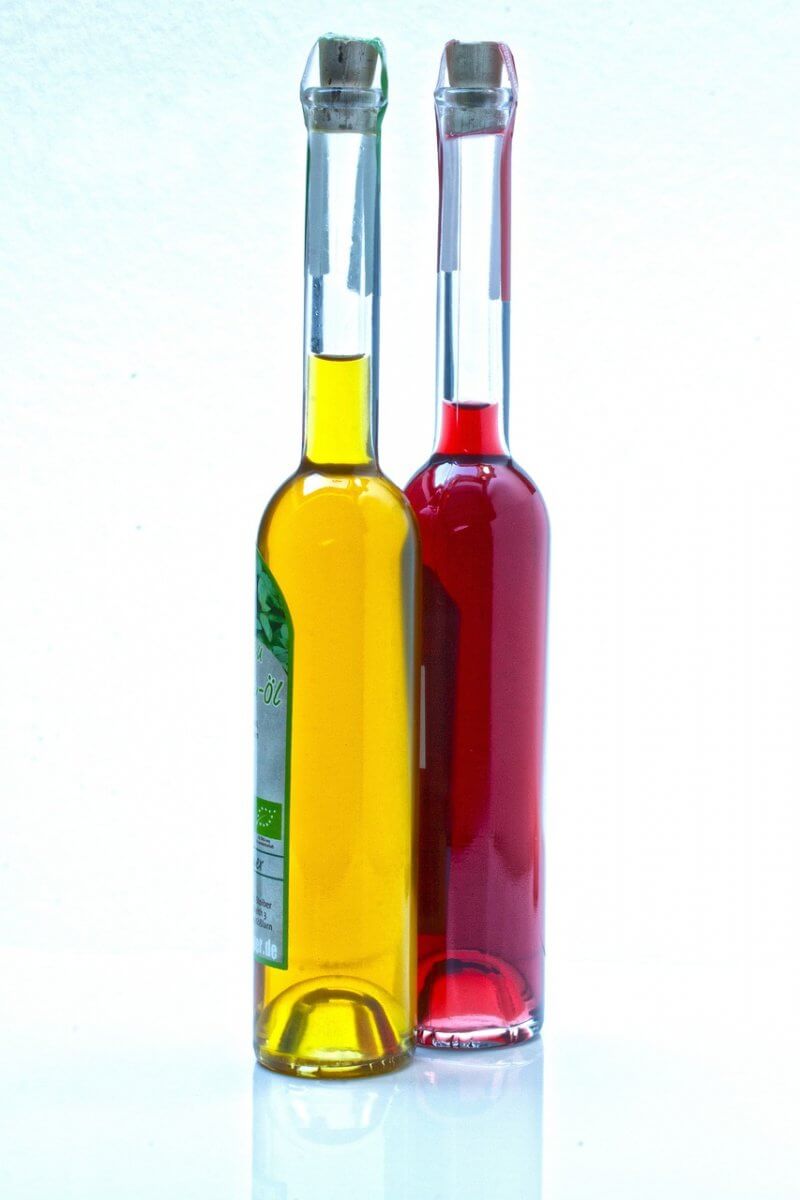
Apple Cider
Apple cider can be an excellent substitute for apple juice in various recipes, especially in dishes that can benefit from its unique flavor and slightly different characteristics. Here’s how you can use apple cider as a substitute for apple juice:
- Beverages: Try apple cider on its own as a refreshing drink, much like apple juice. It has a richer, more complex flavor with a hint of spiciness, making it an ideal fall or winter beverage.
- Cooking and Baking: Use apple cider as a cooking liquid in savory dishes, just like apple juice. It works well for deglazing pans, creating sauces, and braising meats, adding a delightful apple flavor to the dish.
- Marinades and Glazes: You can use apple cider as a base for marinades and glazes for meats, providing a sweet and tangy flavor that complements the meat’s taste.
- Baking: In baking recipes, apple cider can work as a substitute for apple juice, particularly in fall-themed desserts like apple pies, apple crisps, and apple muffins.
- Poaching Fruit: Apple cider is an excellent liquid for poaching fruits, like pears or peaches, which are traditionally poached in apple juice. The cider’s spiciness can add depth to the poached fruit.
- Cocktails and Mocktails: Apple cider is a key ingredient in various cocktails and mocktails, especially those associated with the autumn season. It pairs well with spices like cinnamon and nutmeg.
When using apple cider as a substitute for apple juice, keep in mind that apple cider has a more pronounced flavor, especially if it’s unfiltered and has added spices. Adjust other sweeteners or spices in your recipe to account for the cider’s taste. Additionally, apple cider may have a slightly darker color and a bit of sediment due to the apple particles, which can affect the appearance of the final dish or drink.
Overall, apple cider can be a fantastic and flavorful substitute for apple juice, especially in dishes where its distinct taste and characteristics are welcome. Enjoy experimenting with this delicious fall-inspired ingredient!
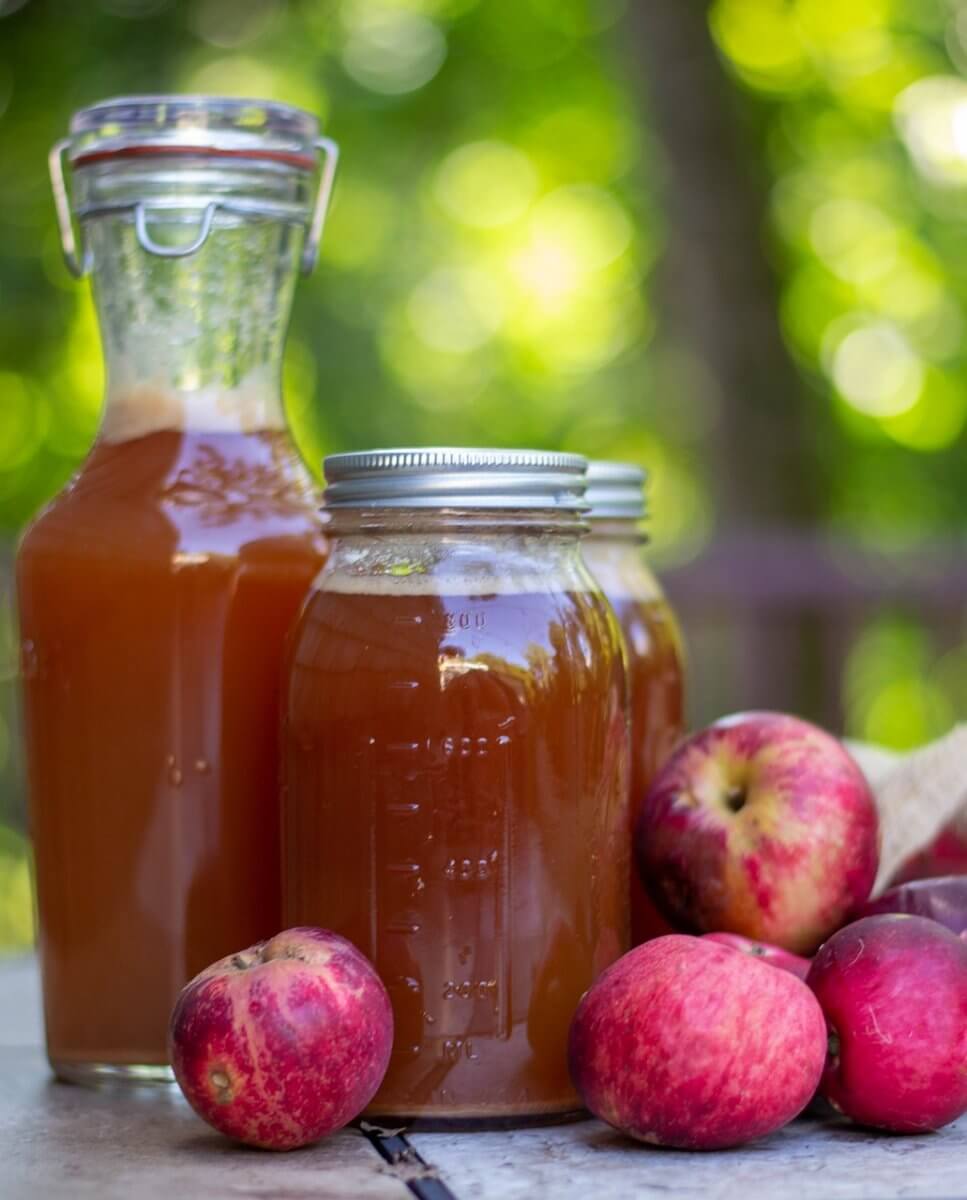
Summary for Apple Juice substitutes
Okay – that’s you all sorted with suitable substitutes for apple juice.
Hopefully the suggestions above have given you some fresh ideas on how to substitute apple juice. Whether you go for a fruit option, or something a bit stronger that includes alcohol, just remember to taste as you cook so you can get the balance right.
We have gathered together a lot more facts on ingredients such as herbs, spices, oils, nuts, etc. if you would like to learn some more.
